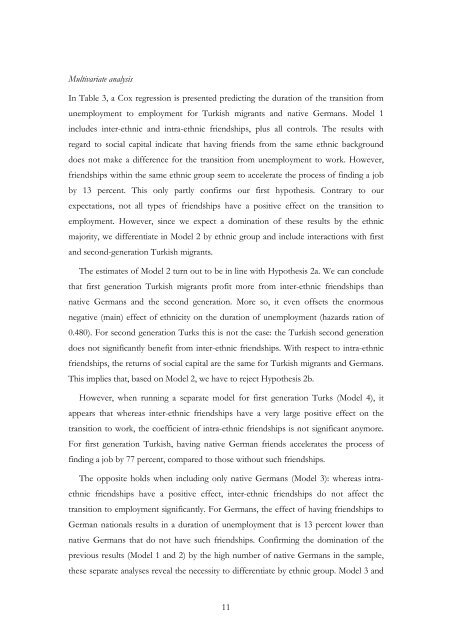Turkish migrants and native Germans compared - IMISCOE Cross ...
Turkish migrants and native Germans compared - IMISCOE Cross ...
Turkish migrants and native Germans compared - IMISCOE Cross ...
Create successful ePaper yourself
Turn your PDF publications into a flip-book with our unique Google optimized e-Paper software.
Multivariate analysisIn Table 3, a Cox regression is presented predicting the duration of the transition fromunemployment to employment for <strong>Turkish</strong> <strong>migrants</strong> <strong>and</strong> <strong>native</strong> <strong>Germans</strong>. Model 1includes inter-ethnic <strong>and</strong> intra-ethnic friendships, plus all controls. The results withregard to social capital indicate that having friends from the same ethnic backgrounddoes not make a difference for the transition from unemployment to work. However,friendships within the same ethnic group seem to accelerate the process of finding a jobby 13 percent. This only partly confirms our first hypothesis. Contrary to ourexpectations, not all types of friendships have a positive effect on the transition toemployment. However, since we expect a domination of these results by the ethnicmajority, we differentiate in Model 2 by ethnic group <strong>and</strong> include interactions with first<strong>and</strong> second-generation <strong>Turkish</strong> <strong>migrants</strong>.The estimates of Model 2 turn out to be in line with Hypothesis 2a. We can concludethat first generation <strong>Turkish</strong> <strong>migrants</strong> profit more from inter-ethnic friendships than<strong>native</strong> <strong>Germans</strong> <strong>and</strong> the second generation. More so, it even offsets the enormousnegative (main) effect of ethnicity on the duration of unemployment (hazards ration of0.480). For second generation Turks this is not the case: the <strong>Turkish</strong> second generationdoes not significantly benefit from inter-ethnic friendships. With respect to intra-ethnicfriendships, the returns of social capital are the same for <strong>Turkish</strong> <strong>migrants</strong> <strong>and</strong> <strong>Germans</strong>.This implies that, based on Model 2, we have to reject Hypothesis 2b.However, when running a separate model for first generation Turks (Model 4), itappears that whereas inter-ethnic friendships have a very large positive effect on thetransition to work, the coefficient of intra-ethnic friendships is not significant anymore.For first generation <strong>Turkish</strong>, having <strong>native</strong> German friends accelerates the process offinding a job by 77 percent, <strong>compared</strong> to those without such friendships.The opposite holds when including only <strong>native</strong> <strong>Germans</strong> (Model 3): whereas intraethnicfriendships have a positive effect, inter-ethnic friendships do not affect thetransition to employment significantly. For <strong>Germans</strong>, the effect of having friendships toGerman nationals results in a duration of unemployment that is 13 percent lower than<strong>native</strong> <strong>Germans</strong> that do not have such friendships. Confirming the domination of theprevious results (Model 1 <strong>and</strong> 2) by the high number of <strong>native</strong> <strong>Germans</strong> in the sample,these separate analyses reveal the necessity to differentiate by ethnic group. Model 3 <strong>and</strong>11


